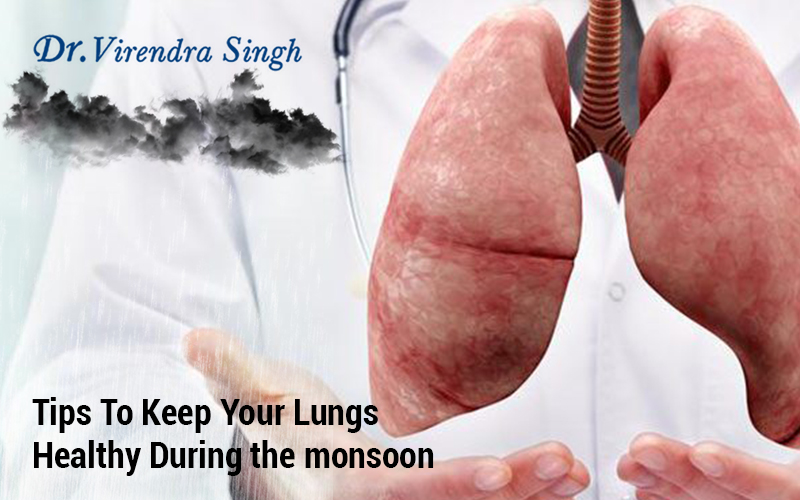
Lungs Healthy During the Monsoon: There’s a cool mood in the atmosphere as the rainy season draws near, providing much-needed respite from the intense heat. However, along with the pleasant rains, this season also brings challenges to our health, especially our respiratory system. Elevated levels of humidity in the air have the potential to foster the development of allergies and microorganisms, posing a threat to human health. Whether you live in a village, or in a city, the chances are that you look forward to the advent of the monsoon. It is the signal for the agrarian population to start planting crops. There are few who fear the monsoons. Those who do probably live in areas where the monsoon spells floods, landslides, and widespread illness caused by mosquitoes, or contamination of potable water.
Ironically, during the monsoon season, respiratory discomfort is common among generally healthy individuals as well as those with Asthma. One of the main reasons for these high levels of humidity, especially when it is overcast, but not raining. You may experience a sensation that oxygen is not entering your lungs. Dr. Virendra Singh, a renowned pulmonologist, emphasizes several key practices to maintain optimal lung health during the monsoon season. His professional counsel centers on the significance of indoor air quality and how it affects respiratory health directly.
According to Dr. Virendra Singh, keeping indoor spaces well-ventilated and free from dampness is crucial to prevent the growth of mold and allergens that can exacerbate respiratory conditions. He also suggests eating a balanced diet high in antioxidants to enhance immunological function and frequent exercise to improve lung capacity. To safeguard your respiratory health during this season, here are five crucial suggestions to help you breathe easily and maintain good lung health throughout the monsoon.
Maintain Indoor Air Quality
We usually stay indoors more during the monsoon season to avoid getting wet. That being said, being inside does not guarantee that you are protected from toxins. Reduced ventilation can lead to at least as much contamination in indoor air. To maintain good indoor air quality, consider the following:
- Use air purifiers equipped with HEPA filters to trap allergens, dust, and airborne pollutants.
- Keep the air flowing freely in your living area by utilizing exhaust fans and opening windows.
- Regularly clean and dust your home to prevent the accumulation of mold and allergens.
Avoid Exposure to Dampness
In the monsoon’s damp and muggy climate, mold and mildew grow. Spores released into the air by these fungi can induce allergies and respiratory problems, particularly in those with asthma or other lung conditions. To minimize exposure to dampness:
- To stop water from leaking into your house, fix any leaks as soon as possible.
- Avoid hanging wet clothes indoors, as they release moisture into the air.
- Control the humidity levels in your home and prevent the growth of mold by using a Dehumidifier.
Stay Hydrated
Water consumption is crucial for overall health and is especially vital during the monsoon season. Even though the weather may be becoming colder, your body still needs enough water to perform at its best. Maintaining the thin mucus lining your respiratory tract, which serves as a defense against foreign objects, is made easier with proper hydration. Make sure to have 8 to 10 glasses of water daily, and consider consuming warm fluids like herbal teas and soups to soothe your respiratory system.
Exercise Indoors
Maintaining lung health requires regular physical activity, but exercising outside during the monsoon might expose you to wet, filthy air, raising your risk of respiratory problems. Instead, opt for indoor exercises, such as Yoga, stretching routines, or home workouts. Engaging in indoor activities helps you stay healthy and protects you from dangerous air pollution.
Practice Respiratory Hygiene
Maintaining proper respiratory hygiene is essential for preventing airborne diseases in both you and other people. During the monsoon, various respiratory illnesses, including cold, and flu, are more prevalent. To minimize the risk of infections:
- Stay away from people who are showing signs of respiratory diseases.
- Dispose of the used tissues immediately and wash your hands afterward.
- Wear a mask to lessen your exposure to airborne diseases, especially in crowded places.
Additional Tip: Consume Lung-Healthy Foods
A balanced diet plays an essential role in maintaining lung health. Some meals can strengthen the immunity of your respiratory system and make it easier for you to adjust to seasonal changes. Incorporate the following lung-healthy doods into your diet:
- Garlic: Garlic is well-known for having antibacterial qualities, which can help prevent respiratory infections.
- Citrus Fruits: These fruits, which are high in Vitamin C, support a stronger immune system.
- Turmeric: Turmeric’s primary ingredient, curcumin, has anti-inflammatory and antioxidant properties that are beneficial to lung health.
- Ginger: Ginger can help with respiratory problems because of its anti-inflammatory qualities.
Conclusion
Although the monsoon is a lovely season that relieves the heat, it also raises concerns for our respiratory health. You may keep your lungs robust and resilient throughout the monsoon by adhering to these five crucial suggestions and leading a healthy lifestyle. Avoid exposure to dampness, prioritize indoor air quality, exercise indoors, stay hydrated, and practice respiratory hygiene to ensure a season filled with good health and easy breathing. If you follow these suggestions, you’ll be able to fully enjoy the monsoon while protecting your lungs from any illnesses.
FAQs
Why is lung health particularly important during the monsoon season?
The monsoon season brings with it increased humidity, which can promote the formation of dust mites and mold, making lung health more important. These can trigger allergies and respiratory infections.
What can I do to improve indoor air quality during the monsoon?
To improve indoor air quality, ensure your home is well-ventilated. Use exhaust fans in kitchens and bathrooms, and open windows when possible to allow fresh air to circulate. Steer clear of carpets and thick draperies that can collect dust and dampness.
How can diet impact lung health during monsoon?
A healthy diet can significantly impact lung health. During the monsoon, include foods rich in Antioxidants, such as vegetables (Spinach, Broccoli), and fruits ( Oranges, Berries). These can assist reduce inflammation and strengthen the immune system.
Are there specific exercises that can help maintain lung health?
Yes, regular physical activity can enhance lung function. Exercises involving the diaphragm and pursed lips can improve the efficiency and capacity of the lungs. Aerobic exercises like jogging, walking, and swimming are also beneficial.
Can air purifiers help during the monsoon?
Yes, air purifiers can be beneficial during the monsoon by removing airborne particles, including pollen, dust, and mold spores, from indoor air. Choose an air purifier with a HEPA filter for the best results.
